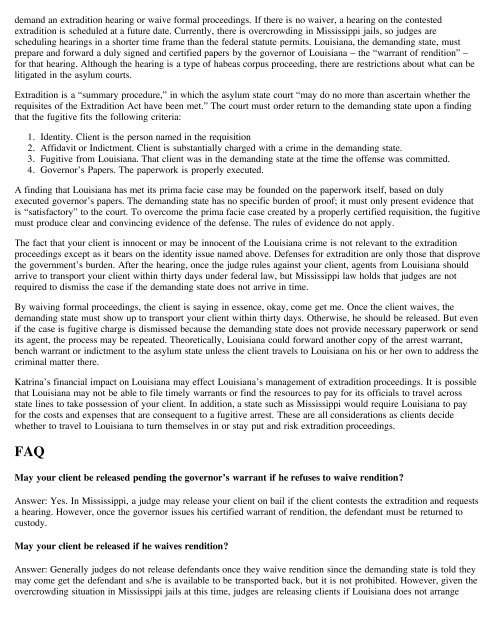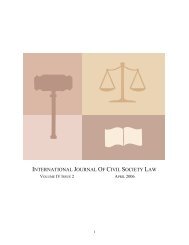Hurricane Katrina: Legal Issues - Columbus School of Law
Hurricane Katrina: Legal Issues - Columbus School of Law
Hurricane Katrina: Legal Issues - Columbus School of Law
You also want an ePaper? Increase the reach of your titles
YUMPU automatically turns print PDFs into web optimized ePapers that Google loves.
demand an extradition hearing or waive formal proceedings. If there is no waiver, a hearing on the contested<br />
extradition is scheduled at a future date. Currently, there is overcrowding in Mississippi jails, so judges are<br />
scheduling hearings in a shorter time frame than the federal statute permits. Louisiana, the demanding state, must<br />
prepare and forward a duly signed and certified papers by the governor <strong>of</strong> Louisiana – the “warrant <strong>of</strong> rendition” –<br />
for that hearing. Although the hearing is a type <strong>of</strong> habeas corpus proceeding, there are restrictions about what can be<br />
litigated in the asylum courts.<br />
Extradition is a “summary procedure,” in which the asylum state court “may do no more than ascertain whether the<br />
requisites <strong>of</strong> the Extradition Act have been met.” The court must order return to the demanding state upon a finding<br />
that the fugitive fits the following criteria:<br />
1.<br />
Identity. Client is the person named in the requisition<br />
2.<br />
Affidavit or Indictment. Client is substantially charged with a crime in the demanding state.<br />
3.<br />
Fugitive from Louisiana. That client was in the demanding state at the time the <strong>of</strong>fense was committed.<br />
4.<br />
Governor’s Papers. The paperwork is properly executed.<br />
A finding that Louisiana has met its prima facie case may be founded on the paperwork itself, based on duly<br />
executed governor’s papers. The demanding state has no specific burden <strong>of</strong> pro<strong>of</strong>; it must only present evidence that<br />
is “satisfactory” to the court. To overcome the prima facie case created by a properly certified requisition, the fugitive<br />
must produce clear and convincing evidence <strong>of</strong> the defense. The rules <strong>of</strong> evidence do not apply.<br />
The fact that your client is innocent or may be innocent <strong>of</strong> the Louisiana crime is not relevant to the extradition<br />
proceedings except as it bears on the identity issue named above. Defenses for extradition are only those that disprove<br />
the government’s burden. After the hearing, once the judge rules against your client, agents from Louisiana should<br />
arrive to transport your client within thirty days under federal law, but Mississippi law holds that judges are not<br />
required to dismiss the case if the demanding state does not arrive in time.<br />
By waiving formal proceedings, the client is saying in essence, okay, come get me. Once the client waives, the<br />
demanding state must show up to transport your client within thirty days. Otherwise, he should be released. But even<br />
if the case is fugitive charge is dismissed because the demanding state does not provide necessary paperwork or send<br />
its agent, the process may be repeated. Theoretically, Louisiana could forward another copy <strong>of</strong> the arrest warrant,<br />
bench warrant or indictment to the asylum state unless the client travels to Louisiana on his or her own to address the<br />
criminal matter there.<br />
<strong>Katrina</strong>’s financial impact on Louisiana may effect Louisiana’s management <strong>of</strong> extradition proceedings. It is possible<br />
that Louisiana may not be able to file timely warrants or find the resources to pay for its <strong>of</strong>ficials to travel across<br />
state lines to take possession <strong>of</strong> your client. In addition, a state such as Mississippi would require Louisiana to pay<br />
for the costs and expenses that are consequent to a fugitive arrest. These are all considerations as clients decide<br />
whether to travel to Louisiana to turn themselves in or stay put and risk extradition proceedings.<br />
FAQ<br />
May your client be released pending the governor’s warrant if he refuses to waive rendition?<br />
Answer: Yes. In Mississippi, a judge may release your client on bail if the client contests the extradition and requests<br />
a hearing. However, once the governor issues his certified warrant <strong>of</strong> rendition, the defendant must be returned to<br />
custody.<br />
May your client be released if he waives rendition?<br />
Answer: Generally judges do not release defendants once they waive rendition since the demanding state is told they<br />
may come get the defendant and s/he is available to be transported back, but it is not prohibited. However, given the<br />
overcrowding situation in Mississippi jails at this time, judges are releasing clients if Louisiana does not arrange

















